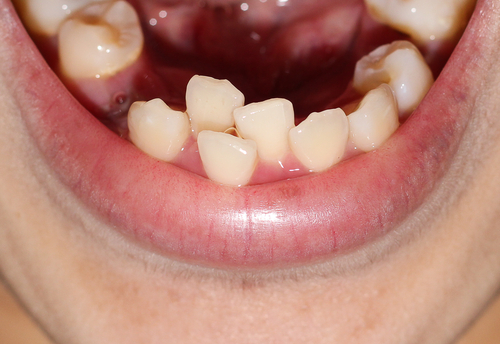The unfitting teeth are a common problem where the upper and lower teeth don’t meet each other perfectly to form the bite. A balanced bite is essential for chewing, speaking, and many other functions. Causes of an uneven bite vary between genetics, misalignment, traumatic injury, or poorly fitting appliances.
An uneven bite, also known in the dental world as Malocclusion is far more common than most people think. In fact, only 35% of adults have “perfect teeth”. Statistically, about 80% of females and 78% of males suffer from malocclusion.
At Inglewood Family Dental, we help people overcome their misaligned bites every day. If you or someone you love is suffering from an uneven bite, our Calgary dentist will examine your mouth to identify the misalignment and if indicated, perform x-rays to identify the type and the degree so that we can ultimately correct the malocclusion.
Signs You Might Have an Uneven Bite
There are some symptoms and signs that, if present, you should doubt of uneven bite and consult your dentist.
Cosmetic Problem
This is the first and easiest way to tell if you have an uneven bite or not. All you need is to look at the mirror and try to identify the misalignment with your face midline (when you smile) and with your other teeth.
Some people may not notice the uneven bite of its minor and requires a good dentist to identify it. However, some teeth may appear twisted or overcrowded which is very apparent to identify.
Speaking Problems
Enunciating words requires a proper and even space for the tongue to move in all directions perfectly. Thus, non-fitting teeth may obstruct the normal movement of the tongue, leading to difficulty in speaking and even a lisp that will bother you.
Headache
Your jaw movement works in a certain way that’s controlled by the muscles of mastication. Therefore, the misalignment in your teeth will exert more effort and strain on your jaw muscles to compensate, this excessive straining will develop pain around your jaw, TMJ, and in your head.
Clenching Teeth
Another problem that results from over-straining of jaw muscles to compensate for misaligned teeth. Your jaw will try to align itself and that leads to clenching of your teeth when you’re asleep, a condition that sometimes is called bruxism.
In addition, problems with TM Joint are common with bruxism, such as pain and atrophy. Hearing a click while you’re chewing or yawning is a sign of bruxism and strained jaw muscles.
Wearing out and Sensitivity
Bruxism and continuous clenching of teeth will wear out and weaken the enamel. In addition, the worn spots will expose the underlying structures to cold or hot drinks and lead to toothache. The erosion and wearing out may lead to cavities and tooth decay as well.
Damage to Previous Work
If you’re putting caps on your teeth or you’ve done any other work such as fillings, the clenching, and uneven bite will lead to damage for these works, which is a financial burden.
Treatment of an Uneven Bite
There are different steps for treating this condition:
- First, the dentist will recommend a mouth guard during the night to help protect your teeth from clenching.
- The second is orthodontic intervention, which includes braces, clear aligners, or retainers to re-align the teeth. In severe cases, the patient may need surgery.
- The third is bite correction with crowns if some teeth are misshaped
Schedule A Free Consultation Today
When it comes to straightening teeth and improving a smile, metal braces have been the long-standing treatment option. However, now Invisalign invisible braces offer another option. Instead of a mouth full of brackets and wires for months on end, Invisalign offers clear, removable aligners that slowly work to straighten your teeth. They are perfect for both teenagers and adults and offer a great alternative to traditional braces to help correct an uneven bite.
Schedule a free consultation with our dedicated Calgary dentists to learn more about Invisalign and other treatment options to help correct an uneven bite.


